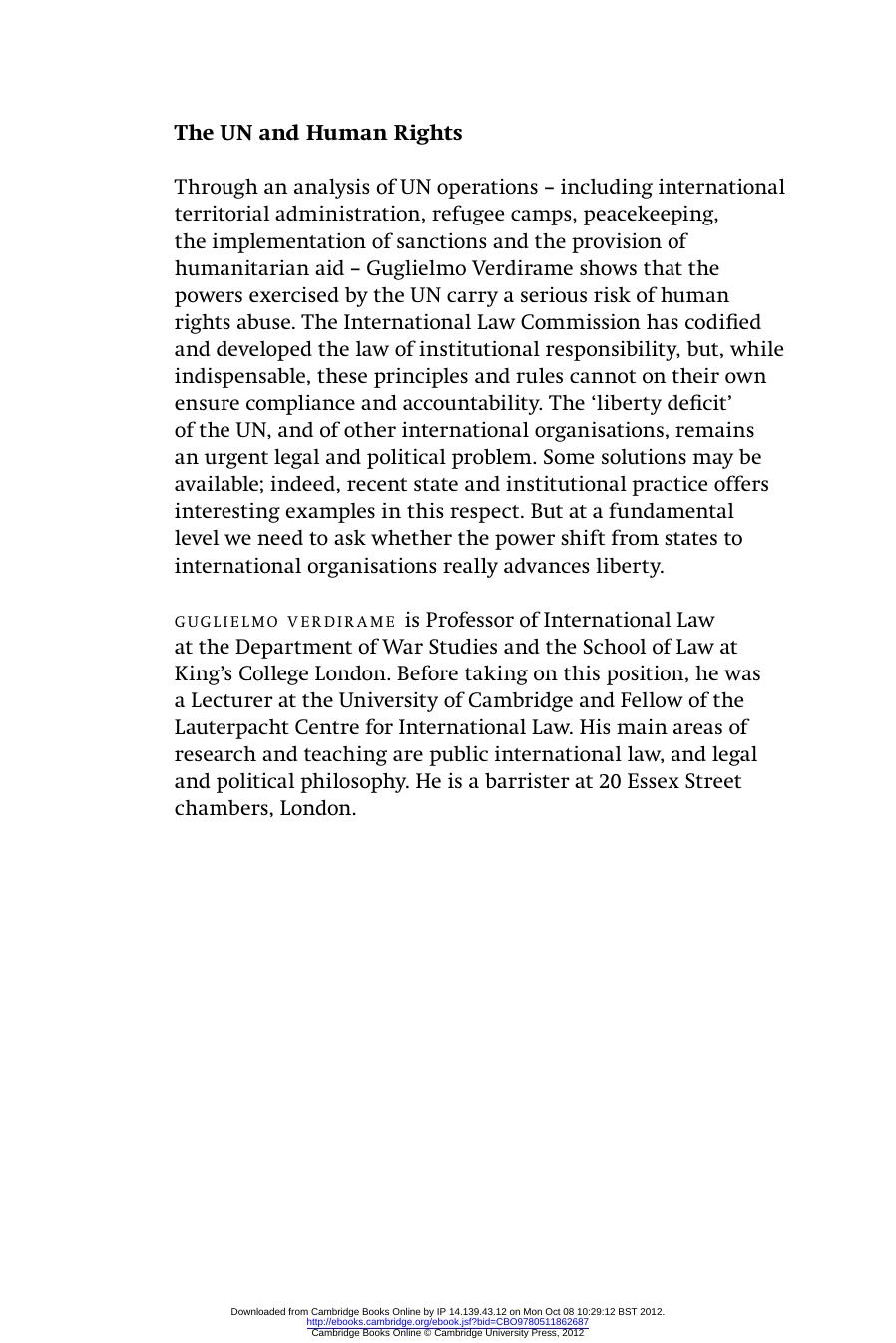The UN and Human Rights: Who Guards the Guardians? by Professor Guglielmo Verdirame

Author:Professor Guglielmo Verdirame
Language: eng
Format: mobi, pdf
Tags: Foreign & International Law, Law, Education & Reference
ISBN: 9780521841900
Publisher: Cambridge University Press
Published: 2010-01-01T18:30:00+00:00
Cambridge Books Online
http://ebooks.cambridge.org/
The UN and Human Rights
Who Guards the Guardians?
Guglielmo Verdirame
Book DOI: http://dx.doi.org/10.1017/CBO9780511862687
Online ISBN: 9780511862687
Hardback ISBN: 9780521841900
Chapter
6 - International administrations pp. 230-299
Chapter DOI: http://dx.doi.org/10.1017/CBO9780511862687.010
Cambridge University Press
6
International administrations
Introduction
It is axiomatic that authorities that exercise effective control over an
inhabited territory have the functional capacity – the power, but not
the right – to violate human rights. When the UN, which is no excep-
tion to this axiom, exercises territorial control, it normally does so
on the basis of an express mandate contained in a resolution of the
Security Council, in a treaty, or both; but there are also situations,
most notably refugee camps, in which the UN controls an inhabited
territory in the absence of such an express mandate, that is on a de
facto basis.
Those in effective control of territory may be assimilated to ‘public offi cials
or other persons acting in an offi cial capacity’ for the purposes of the def-
inition of torture and other human rights (see Article 1 of the Convention
Against Torture and Other Cruel, Inhuman or Degrading Treatment or
Punishment). The Committee Against Torture noted that ‘for some years
Somalia has been without a central government’ and that some ‘factions
operating in Mogadishu … have set up quasi-governmental institutions and
are negotiating the establishment of a common administration. It follows
then that, de facto , those factions exercise certain prerogatives that are com-
parable to those normally exercised by legitimate governments’. 1 For a nar-
rower view with respect to the risk posed ‘by a non-governmental entity’,
see GRB v Sweden (15 May 1998) CAT/C/20/D/083/1997 (at para. 6.5), where the
Committee considered the risk of rape or torture from the Shining Path
( Sendero Luminoso ) in Peru) to fall outside of Article 3 of the Convention.
International administrations of territory by a group of states, rather
than by an international organisation, were instituted in the nineteenth
1 See Elmi v. Australia (14 May 1999) CAT/C/22/D/120/1998, at paras. 6.5 and 6.7.
230
Downloaded from Cambridge Books Online by IP 14.139.43.12 on Mon Oct 08 10:31:29 BST 2012.
http://dx.doi.org/10.1017/CBO9780511862687.010
Cambridge Books Online © Cambridge University Press, 2012
introduction
231
century, the leading examples being the Free City of Cracow (1815–46),
the City of Shanghai (1845–1944) and the Island of Crete (1897–1909). 2
The administration of the Saarland by the League of Nations after the
First World War was the fi rst instance of an international organisa-
tion ruling over a territory. The League of Nations also had an admin-
istrative role in the City of Danzig under the terms of the Treaty of
Versailles, but on a more limited basis than in Saarland. The resident
High Commissioner of the League in Danzig acted as court of fi rst
instance in disputes between Poland and Danzig, while appeals were
considered by the Council of the League, which could in turn request an
advisory opinion from the Permanent Court of International Justice. 3
In the aftermath of the Second World War, the UN drew up plans for
various international administrations, for example in the Free City of
Trieste and in Jerusalem, but none was implemented until the inter-
national administration of West New Guinea (West Irian) in 1962–3 fol-
lowing an agreement between Indonesia and the Netherlands. 4 Since
the end of the cold
Download
The UN and Human Rights: Who Guards the Guardians? by Professor Guglielmo Verdirame.pdf
This site does not store any files on its server. We only index and link to content provided by other sites. Please contact the content providers to delete copyright contents if any and email us, we'll remove relevant links or contents immediately.
The Pirates of Somalia by Jay Bahadur(1625)
Political Theology by Carl Schmitt(1577)
The Holocaust: A New History by Laurence Rees(1521)
The Social Animal by David Brooks(1452)
A Practical Guide to International Arbitration in London by Hilary Heilbron(1434)
Restitution by Restitution(1424)
Pirates of Somalia by Jay Bahadur(1381)
Coercing Virtue by Robert H. Bork(1357)
The Nuremberg Interviews by Leon Goldensohn(1304)
Basic International Corporate Taxation by Sebastiano Garufi(1214)
A History Of Thailand by Baker Chris(1190)
International Trade and Business: Law, Policy and Ethics by Gabriël Moens & Peter Gillies(1137)
The Global Commons by Susan J. Buck(1137)
The Sovereignty of Human Rights by Macklem Patrick(1113)
Blood Profits by Vanessa Neumann(1113)
Asian Waters by Humphrey Hawksley(1113)
Spring Fever: The Illusion of Islamic Democracy by McCarthy Andrew C(1102)
The Nuremberg Trials: The Nazis and their Crimes Against Humanity by Roland Paul(1043)
Crimes Against Humanity: Historical Evolution and Contemporary Application by M. Cherif Bassiouni(1027)
